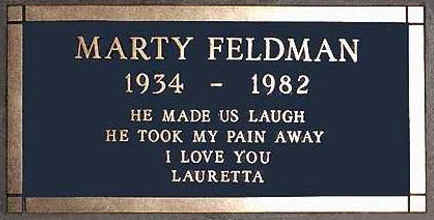|
The Marty Feldman Comedy Machine was the idea of Larry Gelbart, the brilliant American producer who was living in London at
the time but would shortly return to the USA to develop the feature film M*A*S*H into a TV sitcom and then soar with it to
unparalleled heights.
Gelbart had seen Marty Feldman's hugely successful BBC TV series and wanted to produce some material geared especially
for the American viewer. With his international track record and reputation, Sir Lew Grade was the obvious man with whom to
do business, so The Marty Feldman Comedy Machine saw the comic switch to the commercial network - ITV - and work with the
US audience in mind.
Each weekly edition featured a prominent guest star - Orson Welles, Groucho Marx, Art Carney (The Honeymooners) and Barbara
Feldon (Get Smart) among them - as well as internationally known singers like Thelma Houston and Randy Newman.
To maintain British interest, Spike Milligan was engaged throughout the run and Terry Gilliam, scoring tremendous success
with Monty Python's Flying Circus, provided animations, including the title sequence.
The result was an occasionally brilliant but ultimately patchy piece of work that went out in Britain late at night and,
frankly, failed to amuse very much. Before long, Gelbart - like a number of Feldman's other collaborators - grew frustrated
with the star's personality; indeed, he tried to withdraw from the series altogether.
Grade persuaded him to stay and complete the 14 editions, but an option on a second series was never fulfilled. Some of
the sketches were very good, though, indeed the best bits were worked into a half-hour compilation programme, screened in
Britain on 15 February 1972 (repeated by C4 on 30 December 1987), which won the Top Comedy Award and also the Golden Rose
at the 1972 Montreux Festival.
In America, where the series was networked by ABC, the 14 programmes were re-edited into half-hour shows, screened from
12 April to 23 August 1972. Although here too they were not an overwhelming success, the series served as Feldman's entrée
into American popular culture.
While he would work once more with the BBC in 1974, Feldman spent most of his remaining years in Hollywood, starring in
US feature films that ranged from the excellent (notably Mel Brooks' Young Frankenstein and Silent Movie) to the dire ( In
God We Trust).

|



